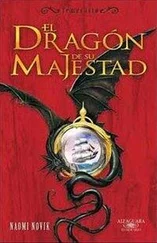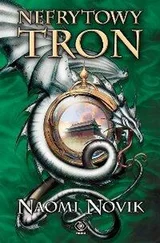“You are speaking treason,” Laurence said, without feeling, oddly calm; the words only a recitation of fact, distant.
“Very well,” Temeraire said, “if I am an animal, and may be poisoned off like an inconvenient rat, I cannot be expected to care; and I do not. You cannot tell me I should obey; you cannot tell me I should stand idle—”
“It is treason!” Laurence said.
Temeraire stopped, and looked at him only. Laurence said, low and exhausted, “It is treason. Not disobedience, not insubordination; it cannot—there is no other name which it can bear. This Government is not of my party; my King is ill and mad; but still I am his subject. You have sworn no oath, but I have.” He paused. “I have given my word.”
They were silent again. There was a clamor back in the trees; some of the ground-crew men returning from their day’s leave, noisy with liquor; a snatch of raised song— that saucy little trim-rigged doxy —and roar of laughter, as they went into the barracks-house, their lanterns vanishing.
“Then I must go alone,” Temeraire said wretchedly, so softly that for once there was real difficulty in making out the words. “I will go alone.”
Laurence breathed once more; hearing it, said aloud, made everything quite clear. He was grateful, it occurred to him, that Jane had refused; that he had not that pain to give. “No,” he said, and stepped forward, to put his hand on Temeraire’s side.
LAURENCE WROTE TO Jane, the merest word; no apology could suffice, and he would not insult her, by asking her to sympathize, adding only:
…and I wish to make clear, that I have in no wise made my thoughts known to, nor received Aid of, my officers, my crew, or any man; and, neither deserving nor soliciting any excuse for my own Part, do heartily entreat that all blame attaching to these my actions should be laid at my door alone, and not upon those who cannot even be charged, as might on similar occasions be merited, with culpable blindness, my Resolve having been formed bare minutes before setting ink to this Page, and will upon its enclosure be immediately carried out.
I will not trespass further upon the Patience which I fear I have already tried past all hope of endurance, and beg you only to believe me, in despite of the present Circumstances,
Yr obdt Svt, &c.
He folded it over twice, sealed it with especial care, and laid it flat upon his neatly made cot, the address faced upwards; and left his small quarters, walking between the narrow rows of snoring men to go outside again. “You may be dismissed, Mr. Portis,” he said to the officer of the watch, who was nodding at the edge of the clearing. “I will take Temeraire up for a turn; we will not have a quiet flight again in some time.”
“Very good, sir,” Portis said, barely concealing a bloodshot yawn, and did not stay to be persuaded further: not quite drunk, but his gait a little shambling as he went back to the barracks-house.
It was not nine. In an hour, at most two, Laurence supposed, they should be missed; he relied on scruple to forbid Ferris’s opening the letter, addressed to Jane, until he began to suffer a greater degree of anxiety, which might save another hour; but then the pursuit would be furious. There were some five couriers in the covert sleeping now; more by Parliament; some of the fastest flyers in all Britain. They had not only to outrun them to Loch Laggan, but after to the coast: every covert, every shore battery from Dover to Edinburgh would be roused to bar their passage.
Temeraire was waiting, ruff pricked, agitated and crouched small to conceal it. He put Laurence upon his neck, and launched quickly; London falling away, a collection of lamps and lanterns and the bitter smoke of ten thousand chimneys, ships’ lights moving gently down the Thames, and only the rushing hollow sound of wind. Laurence shut his eyes, until they had grown accustomed, then looked at his compass to give Temeraire the direction: four hundred miles, north by north-west, into the dark.
It was strange to be all alone on Temeraire’s back again, not merely for a pleasure-flight; the ordinary round of duty did not often allow it. Unburdened but by the triviality of Laurence’s weight and the barest harness, Temeraire stretched himself and drove high aloft, to the margins where the air grew thin; pale clouds passing beneath them over the dark ground, fellow sailors in the air. His ruff was flattened down, and the wind came whistling hard over his back, cold at these heights even in the midst of August; Laurence drew his leather coat more snugly close, and put his hands beneath his arms. Temeraire was going very fast; his wings beating a full, cupped stroke, and the world beneath blurred when Laurence looked over his shoulder.
Close towards dawn, Laurence saw to the distant west faintly an eerie glow which illuminated the curve of the earth, as if the sun meant to rise the wrong way round; a color broken, now and again, by belching smoke: Manchester, and its mills, he guessed, so they had gone some hundred and sixty miles, in less than seven hours. Twenty knots, twenty-five.
A little after dawn, Temeraire stooped, without a word, and came to ground at the shores of a small lake to drink deeply, his head thrust partway beneath the water, with the gulps traveling convulsively down his throat; he stopped, and panted, and drank some more. “Oh, no; I am not tired; not very tired, only I was so thirsty,” he said a little thickly, turning his head back: despite his brave words he shook himself all over, and blinked away a dazed expression before he asked, in a more normal tone, “Shall I set you down a moment?”
“No; I am very well,” Laurence said; he had his grog-flask with him, and in his pocket a little biscuit, which he had not touched. He wanted nothing; his stomach was closed. “You are making a good time, my dear.”
“Yes, I know,” Temeraire said complacently. “Oh! It is more pleasant than anything, to go so quickly, in pleasant weather, only the two of us; I should like it above all, if only,” he added, looking round sorrowfully, “I did not fear that you were unhappy, dear Laurence.”
Laurence would have liked to reassure him; he could not. They had passed over Nottinghamshire during the night; they might have passed over his home, his father’s house. He rubbed his hand upon the neck-scales, and said quietly, “We had better be off; we are more visible, in the day.”
Temeraire drooped, and did not answer, but launched himself aloft again.
They came in over Loch Laggan after seven hours more, at the dinner-hour; Temeraire without even the pretense of courtesy or warning dived directly into the feeding grounds, and not waiting for the herdsmen seized two surprised cows out of the pen: his descent too swift even for them to bellow. Alighting with them on the ledge which overlooked the training flights, he crammed them one after another down his throat, not pausing even to swallow all the first before he began upon the second. He gave a relieved sigh, afterwards, and belched replete; then daintily began to lick clean his talons before he made a guilty start: they were observed.
Celeritas was lying in the waning sun, upon the ledge, his eyes half-lidded. He looked aged, as he had not during their training, so long ago and yet scarcely three years gone; the luster of his pale jade-colored markings had faded, as cloth washed in too-hot water, and the yellow darkened to a bronzey tone. He coughed a little hoarsely. “You have put on some length, I see.”
“Yes, I am as long as Maximus,” Temeraire said, “or anyway, not much shorter; and also I am a Celestial,” he added smugly: they had left off their training under the pressure of the last threat of invasion, in the year four, at the time unaware of Temeraire’s real breed or his particular curious ability of the divine wind and thinking him instead an Imperial: still a most valuable breed, but not as vanishingly rare.
Читать дальше












